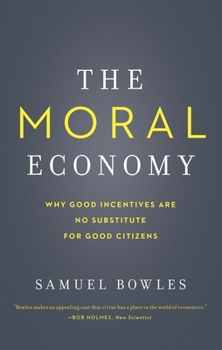The Moral Economy: Why Good Incentives Are No Substitute for Good Citizens
(Part of the Castle Lecture Series Series)
Select Format
Select Condition 
Book Overview
Why do policies and business practices that ignore the moral and generous side of human nature often fail? Should the idea of economic man--the amoral and self-interested Homo economicus--determine how we expect people to respond to monetary rewards, punishments, and other incentives? Samuel Bowles answers with a resounding "no." Policies that follow from this paradigm, he shows, may "crowd out" ethical and generous motives and...
Format:Paperback
Language:English
ISBN:0300230516
ISBN13:9780300230512
Release Date:August 2017
Publisher:Yale University Press
Length:288 Pages
Weight:0.65 lbs.
Dimensions:0.8" x 5.1" x 8.0"
Customer Reviews
0 rating





